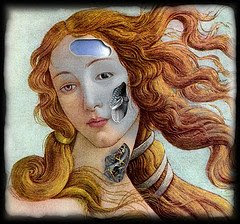Subscribe to:
Post Comments (Atom)
'A heron flew over the bamboo forest--and Siddhartha accepted the heron into his soul, flew over forest and mountains, was a heron, ate fish, felt the pangs of a heron's hunger, spoke the heron's croak, died a heron's death.' From 'Siddhartha' by Herman Hesse







+II+-+socialist+art+by+night+_eulen.jpg)









19 comments:
The conference about ethics named "Why bother with ethics ?" given in Phelma was a great idea !
Trying to teach the future engineers that we are how ethics is important in our lives ,in sciences we're
studying and in humanity future,the different presenters invited to the conference were very interested
in ethics and its role in mind's education .
The conference in general was very interesting and educationnel ,I've learned a lot of things which are
going to make me a better person ethically thinking .
On the first hand,I've to mention that I was particularly disappointed by the presentation "Ethics at work - from theory
to praxis" where the speaker Mrs Gabriela Montorzi's wasn't professional at all , she kept reading her diapositives ,
not talking in the microphone because she couldn't do so while she was reading the diapositives emulated on the wall
behind her , and besides , even the presentation wasn't interesting because all of us knew all the things she talked about ,
Geneva Ethics let us on our hunger .
On the other hand , Dr Henk Ten Have's UNESCO approach was very interesting , he presented to us UNESCO , what is it
and what it's doing . The way he did the presentation was very professional without notes or diapositives , he caught the
audience's attention and was very reacting to the questions we asked him .
Er.M
I thought that the talk was interesting because the man mastered his subject. His way of speaking was agreable. The speed, tone, and volume were perfect. He was here to explain how the CCTIS deals with ethics, and he did it well. Moreover, the slides he used were clear and attractive.
He emphasized something important : the lack of public debate on nanotechnology. I found this crucial, because currently nanotechnologies are inevitably developed, without thinking about consequences to people. This forces activists confront an unchangeable reality. The development of technologies should not be made without thinking about the ethical issues involved.
The conference about ethics named "Why bother with ethics ?" given in Phelma was a great idea !
Trying to teach the future engineers that we are how ethics is important in our lives ,in sciences we're studying and for the manhood future,the different presenters invited to the conference were very interested
in ethics and its role in mind's education .
On the first hand,I've to mention that I was particularly disappointed by the presentation "Ethics at work - from theory to praxis" .
My impression is that the speaker Mrs Gabriela Montorzi wasn't professional enough, she kept reading her diapositives , not talking in the microphone because she couldn't do so while she was reading the diapositives emulated on the wall behind her. Besides, it seems to me that the presentation wasn't interesting because all of us already knew all the principals and values she talked about. On the other hand , she answered well to the audience questions and was very receptive to our suggestions. Anyway, Geneva Ethics left us unsatisfied .
I'm quite certain that Dr Henk Ten Have's UNESCO approach was very interesting ,he presented to us UNESCO, what is it and what it's doing . I don't doubt that the way he did the presentation was very professional, without notes or diapositives, he caught the audience's attention and was well reacting to the questions we asked him .
I feel sure that,in general, the conference was very interesting and educationnel ,I've learned a lot of things which are going to make me a better person ethically thinking .
Science and scandal,
It strikes me that the idea of this conference was very good because scientits have a lot of responsabilities and they learn, at school or at work, how to be good scientist but the never learn how to be ethical.
But my impression was that the contents of the conference seems a little bit superficial beacause in my opinion, Mrs Rubio seemed quite stressedso it was not easy for me to understand. And my impression was that she didn't really reach a clear point.
Moreover, unfortunately she talked a lot about ethics in chimistery which is not my field of expertise.
As i saw it, Mr Ben Ameur was more confident so it was easier for me to understand what he said.
Science and Scandal
The first and most interesting thing I liked during the conference was the fact that people really wanted to make us interessed in the problem.
For instance they gave us a lot of good examples, where science needs ethics.
Moreover they really knew what they were talking about, due to good and pertinent references.
They had a good introduction, because it pointed out examples, where scientists needed ethics to avoid making mistakes with their knowledges. The questions raised were good too, it focused on our doubts about science.
I didn't feel their was anything beyond my level.
Finally I think they chose a good subject which could catch the attention of young people as well as old people.
In the conference entitled "Why bother with ethics ?", I attended the presentation of Gabriola Montorzi. It was about Ethics at work, from theory to practice.
This presentation was well structured and therefore I could easily understand it.
On the other hand, my impression was that the contents were not very surprising or new. Actually, I think the aim was to present some fundamental values that make us more ethical. However, it seemed to me more like just a list of values that at least the majority of people already know and have.
Finally, what I found the most interesting was a question of a student: if we have to face a particular controversial issue with ethical aspect, how can we determine whether our view is right or not? However, the ansewer that it just depends on the situation did not seem to me very satisfying.
Therefore in the next conference, I would like to have more specific or precise advices.
Sofia Z.
The first talk on ethics tituled "why bother with ethics" dealt with the respect of elementary ethical rules.
And the beginning of this talk was realy interesting with all the exemples which were presented.
We could really saw different aspects of manipulations on experiences results and the consequences of their publications in sciences magazines.
Others example with big companies which falsified the result of scientific test in the way to earn more money.
After this introduction with four example of men who played with ethicals rules, the presentation dealt with an other question:
Is ethics necessary in all scientific domains?
The talkers gave us the exampleof electrochemistry in which case we could wonder if there are ethics rules and what are they.
Globally, the presentation was interesting and the actors were motivated, they articulated very well and it sounds well and it was very easy to understand everything they said.
So my impression is that it was a good talk on ethics.
Julien C.
I attended to the last round table about science and ethics.
I found it very interesting because it dealt with a topic that concerns us: we will all work in science.
I liked the presentation of UNESCO because I did not know about this organization very well: the main aims of the organization were explained.
Moreover I enjoyed the presentation of the philosophic view of ethics: for example they said that ethics depends sometimes on a point of view.
But my impression about the overall round table it that it didn't quite have enough dynamism for me: there were often pauses between different speakers.
It seems to me that few people spoke in the audience and it would have been better if they gave more examples: the only unethical thing they evoked was the "Gygès ring" of the Greek time, which is something symbolic but that did not well represents the aim of the round table.
Romain C.
I am sorry but I could not give my opinion on what was said during the conferences because I did not went to chem. In fact, the conferences took place on Thursday after-noon which is the time reserved to the sports activities, and as the weather was sunny and as the night fall late, the rock-climbing lesson ended at 7:30 pm, which was too late to go to the conferences. So my opinion is on the time of the conferences, as the sport is compulsory, it seems to me that it is not smart to put another compulsory event at the same time.
I wasn't at the conference and I wish I was : I feel pretty sure that talking ethics with people (especially with students) is a very important thing because it is a means to sensitize them to the most important issues our 21st century's world is facing.
Environnement, Politics, Economy, science, humanitarian issues are all related to ethics, therefore it seems to me that you are making the very first step to help people to figure out Today's world issues.
On the other hand, it is under my impression that people should be taught to participate, meaning to think of what is good and what is not so as to have a real opinion to share with one another. To my mind this could be the perfect way to make progress and reconcile science and ethics.
Yannis
First of all, it seems to me that the talk was well-prepared because it structure was very clear and the speakers' intervention were appropriate.
Unfortunately, in spite of this good preparation, it is my impression that the organisation was chaotic. Indeed, whereas we have done the effort to be on time despite our intense schedule, it wasn't the case of all the speakers whiche were not present at the beginning. Consequently, the conference didn't start on time.
On the contrary, I would like to thanks the different speakers for efforts they made on pronounciation and language in order to make us easier to figure out. Indeed, ethics is a difficult subject with notions which are not necessarily concrete but they tried to explain it with simple words in the aim we catch them easily.
But maybe they could have done this conference on several days. Because I feel sure that there were so much things to say and develop on ethics that we can't detailed them entirely in only one afternoon.
Besides, I think that the fact there were some students among the speakers was a really good thing because we feel more concerned than if it was an old philisophic man who tries to impose his ideas to new generations.
Patrick M.
First of all, I want to thank the organizers for this interesting conference.
It is obvious that nowadays, we cannot separate science from ethics, and whereas in our ingeneering school, students are not taught so much about that important subject, your presentation was warmly welcomed.
Furthermore, this conference taught me many things nanotechnologies and I was not aware of those improvments in many fields that could totally change the life of millions of people and it is my impression that it could have been a little bit more highlighted.
Pierre T
First of all, I would like you to understand that I did not attend to the whole lecture but only the part which dealt with "Scandals in ethics" so that my opinions are only based on that subject.
It seems good to me that this debate was a participative one. Actually, the audience feels like part of the reflection and is not a passive group of students. However, I would have thought that young students are maybe not the right people to talk about ethics. Except if the purpose is to hear them saying sadly : " Well, it is very bad what mister Rylander did ... ". I think that young students have to become aware of those issues but are not qualified enough to argue about that. That is why I prefered the contribution of professionals who have already been confronted with such thorny issues.
Sylvain MICHEL
The conference which I attended, was given by Miss Natasha Wilcke and was intitled Science & Scandal.
The speaker gave four examples of ethical frauds in the field of science.
First, she talked about Scott S. Reuben who is a professor in anaesthesiology and post-operation pain in Springfield. This scientist is accused of medical fraud because he was working for laboratories especially at Pfizer, which encouraged him to publish false research results pretending that « current » medicine like aspirin, was sufficient to cure post-operation pain especially in orthopaedic surgery. These falsified results were used in patients' treatment for years and years until they were discovered by an internal investigation.
The second scientist is a South-Korean veterinarian researcher called Hwang Woo Suk. He was accused in 2004-2005 of cloning human embryos and stem cells. He was even accused of using his own researcher's eggs to conduct his experiments.
The third case involves also a doctor at the university of Geneva, who published faulty research results on passive-smoking danger because he was sponsored by tobacco producers until being denounced by anti-tobacco activists in 2001.
The last person was a researcher in the field of Nano-Physics who was proposed to win Nobel price but he was proved to be non-ethical as his research wasn't lead scientifically. In fact, there were similar graphs in 16 out of 24 research articles.
It seemed to me that the presentation very interesting, but I am quite certain it would have been better to clear up(clarify/ define) what ethics was first, spell out its use in every day life before judging its application in the field of science.
From my point of view, ethics is a set of principles that should be respected by everyone, in everything one does. It is made up by the protection of human beings and their environment.
These scientific scandals aren't only unethical, they should be at the same time illegal. If people had learnt to apply ethics in their normal behaviour, I feel sure there wouldn't have been anyone who would be trying to harm others for material profit or fame. In my opinion, it is much more important to take into account ethics in every day behaviour as it would be reflected on all human activities. Focusing on famous scientists isn't enough. Indeed, it won't change much. These exceptions should be eradicated from societies. Until that perfect day, it would be better to concentrate our efforts to try to have ethical behaviour.
Last but not least, I have to mention that in spite of all these things, I don't doubt that this conference was very constructive. In fact, the examples illustrated are strong proof which shows that we shouldn't put up with small ordinary abuses, because they are able to bring about dangerous unethical fraud or sometimes "crimes". It would be a wonderful thing if we had more events like this, to learn more and more about ethics.
Selma B
During the conference about ethics, we learnt what ethics is and why it’s an important and essential thing today. When we do something, we have to think about the impacts, for instance, in science. Moreover some behaviour can’t be correct, when scientist lies about a discovery just to become more popular In addition, some subjects in science are today controversial because we don’t know if they’re good or not. That’s why the scientists and science institutions need to think about new technologies and if they will be a danger for humankind. For example, the nanotechnologies are the topic of a lot of discussions. And scientists must be more communicative. Nevertheless it’s a political problem too, because a lot of science institutions are public.
So the topic of the conference was very interesting but some of the speakers weren’t convincing enough. For instance the students of Phelma didn’t quite have enough knowledge of aspects of the topic. However the second speaker who came from the CSSTI was better and knew what he was talking about.
In conclusion, the conference was about a real problem in science, and it was instructive, nonetheless it could have been better if there were specialists in ethics.
Matthieu Z.
The main problem that I had to face at the conference was to understand what evryone was saying. Indeed, because of the vocabulary that was employed and because of the way the people were talking (accent and so on), I had a hard time understanding. Furthermore, some people in the public asked questions, but they weren't facing the public, which made it hard to understand. I admit that it's maybe only because of my modest level in English that I didn't manage to understand evrything ; indeed, a lot of people at the conference seemed to understand evrything. In the parts that I understood, I think that there were some interesting points that were raised. The general subject of the conference was also pretty interesting. The general atmosphere of the conference was also pretty good. Most people over there seemed to be interested in the subject and motivated to participate in the debate. The conference was also well organized, the schedule was respected. In conclusion, the conference was good, it's just too bad I had such a hard time understanding what the people were talking about.
Olivier Mirat
I was present during the last part of the conference, when people leading the conference were answering the audience questions. To my mind, this part was quite interesting thanks to the pertinence of the answers. I have actually the feeling to have learned something this day. But I have the impression that it could have been more interestingby being more interactive. In fact, it was difficult to hear parts of the questions just because of the fact that people asking were facing the speakers and not the audience. It would have been easier to understand if, for example the speakers repeated the questions. Moreover, I think that the audience was small enough to open a kind of debate : it could have been more interesting if the audience could give its own opinion before the speakers answer the questions.
Anyway, to my mind it was a pretty good conference and I am happy I was present this day.
TO be honnest i didn't attend to the conference about ethics named "Why bother with ethics ?" given in Phelma. I will try to explain why.
First I feel sure that conferences are a good way to develop our own reflexion and to become open-minded. However it is my impression that conference could be better organized. I mean that we can hardly speak with participants. Moreover, when emerging from a conference you feel frustrated because of the overwhelming flow of informations. Thus they maybe can do such confernce on several days.
Then It seems to me that speaking about ethics is hypocritical in a certain way. Ethic is a set of criteria which let us to judge morally. So to me, it is a own process of reflexion. In that sense to hear the opinions of the others is not so useful and may even influence us. It is my impression that ethic becomes a social phenomenon maybe a fashion.
Benoit Praly
The conference on Ethics was divided into five parts. I will now deal with the first one.
The first part was entitled "Science and Scandals". The speacker presented to us four examples of scandals involving Scientists who published wrong results or who were accused of working for the Tobacco industry.
Afterwards, two students of Phelma talked about the importance of ethic in science and ingeneering.
In my opinion, the goal of this part was to give us examples of situations where ethic is necessary. But I suppose that anyone with basic scientific education, moreover a student in a school of engeneering, is perfectly aware of the importance of ethic. The problem is that we don't know precisly what ethic is and how we can use it in practice. Of course we have an idee of what it could be because we know that our work can cause a lot of harm and that we can not do whatever we want, but what we don't know is where the limit is and how to find it.
I would have thought that thanks to this conference, I would have found an answer, but I didn't.
As a conclusion I would say that this part of the conference was not realy interesting but would have been better if a specialist of ethic were present.
Thomas.B
Post a Comment